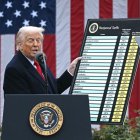China targets Hollywood movies over tariffs, and Trump mocks the move
When asked about the Chinese response to the tariffs, the president wryly said, "I think I've heard worse."

A reference image about Hollywood
China's regime took further retaliation against the President Donald Trumps' high tariffs by imposing immediate restrictions on imported U.S. movies.
In a statement, Beijing's National Film Administration (NFA) justified the move as a response to tariff "abuse" by Washington, noting that rising geopolitical tensions between the two countries will cause Chinese audiences to lose interest in U.S. films.
According to the NFA, "abuse of tariffs on China will inevitably diminish the domestic audience’s favorable view of American films."
Under this argument, the institution affirmed that the measure was taken following the market's rules and respecting the Chinese public's preferences.
Asked about the Chinese regime's measure against Hollywood films, President Trump did not miss the opportunity to ironize before the press: "I think I've heard of worse things," he commented, unleashing laughter from those present.
A reporter asked Trump for his response on China retaliating by reducing the number of Hollywood films allowed in their theaters.
— Ian Miles Cheong (@stillgray) April 10, 2025
Trump: “I think I've heard of worse things." pic.twitter.com/6QlZu5ky0g
The measure, which aims to reduce the U.S. cultural impact in China, was not entirely unexpected. Just this week, two of the most influential bloggers in the Asian giant, including a senior journalist of the state agency Xinhua, anticipated that one of the Chinese regime's potential reprisals against the U.S. was precisely to target Hollywood productions.
However, from an economic point of view, the measure may not have much impact since China has long ceased to be a major market for Hollywood.
In fact, according to experts, the financial impact could be negligible because box office revenues for U.S. productions have declined considerably in China in recent years.
Also, local Chinese productions, in addition to growing its budget levels, are already outperforming U.S. productions in their own territory.
For example, "Ne Zha 2," witha budget of about $80,000,000, surpassed Pixar's "Inside Out 2" and became the highest-grossing animated film of all time in China.
The restrictions on Hollywood films were unveiled after the White House announced Thursday the imposition of new 145% tariffs on Chinese goods, up from the 125% that Trump had announced just a day earlier.



























